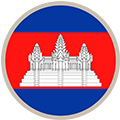Indirect tax - Cambodia
Indirect tax snapshot
Please click on each section to expand further:
Value Added Tax (VAT) is the main type of indirect taxation in Cambodia.
It is a tax on consumption which is applied during the production and distribution process to most goods and services. It is also applied to goods, and certain services, entering the country. Although VAT is ultimately borne by the consumer by being included in the price paid, the responsibility for charging, collecting and paying it to the tax authority at each stage of the process rests with the business making the supply, ie the sale.
A business registered for the tax will charge VAT (output tax) on its sales, and incur VAT (input tax) on its purchases (including any VAT paid at importation). The difference between the output tax and the deductible input tax in each accounting period will be the amount of VAT payable by the business to the tax authority. Where the input tax exceeds the output tax, a refund can be claimed.
A business engaged in non-taxable supplies may not claim VAT input credits (in practical term).
Taxable supply
- Supply of goods or services by the taxable person in the Kingdom of Cambodia.
- Appropriation of goods for his or her own use by the taxable person.
- Making of a gift to or supply at a below cost of goods or services by the taxable person.
- Import of goods into the territory of the Kingdom of Cambodia.
Non-taxable supply
- Public postal service.
- Hospital, clinic, medical, and dental services and the sale of medical and dental goods incidental to the performance of such services.
- The service of transportation of passengers by a wholly state owned by public transportation system.
- Insurance services.
- Primary financial services.
- The importation of articles for personal use that are exempt from customs duties.
- Non-profit activities in the public interest that have been recognized by the Ministry of Economy and Finance.
- Education services.
- Clean water.
- Unprocessed agricultural products.
- Solid and liquid waste.
VAT state charge
- Importation of raw materials of QIP company.
- Importation and supply of agricultural products - fertilizer, seed, animal drugs, animal feed, animal breed and agricultural equipment and tractors.
- Importation of raw material and equipment to produce rice for export.
- Importation of raw material and equipment for directly supporting the export of industrial products such as garments, textiles, footwear, handbags and hats.
- Basic food supplies - meat, all types of egg including fresh or pickled eggs, seafood, all types of sugar, salt and condiment such as fish sauce and soy sauce (for a two-year period from 2022 to 2023 ).
Taxable value
The taxable value shall be determined as follows:
- The taxable value for any supply shall be the price of the goods or services the seller charged the purchaser. The taxable value includes any charges for transportation and other items payable to the seller with respect to the supply, including any specific tax on certain merchandise and services but excluding the tax on value added. Procedures for the adjustment of the taxable value at the time of supply and after the time of supply shall be determined by sub- decree.
- When the payment for a taxable supply involves any consideration other than money for the direct or indirect benefit of the seller, this consideration shall be included in the taxable value at its fair market value.
- The taxable value for any imported good shall be the customs value including insurance and freight plus any customs duties and any specific tax on certain merchandise and services. If there is no such adjusted customs value, the fair market value shall be used.
- If the taxable value of the goods or services supplied does not represent the true value, the tax administration may determine a value for such goods or services and such value shall be presumed to be the correct value until proven otherwise to the satisfaction of the tax administration.
- The taxable value of used goods that the taxable person regularly purchases from consumers for resale or sells on behalf of other persons shall be the differential between the selling price and the purchase price, or the commission from the sale of those goods.
VAT rate:
There are two rates of VAT that are applied to goods and services in the Cambodia:
- a standard rate of 10% on the taxable value of the supply of goods and services in the Kingdom of Cambodia
- 0% on the taxable value of the supply of goods exported and services provided outside of the Kingdom of Cambodia.
VAT on ecommerce:
- The rate of VAT on e-commerce is 10%.
Time of supply
The time of supply shall be determined as follows:
- the tax on value added becomes due and payable at the time of supply
- the time of supply of goods and services shall be the time by which the seller must issue the invoice or the time the seller issues the invoice if that invoice is issued before the time it must be issued by the seller
- a value added tax invoice must be issued within seven days after the goods are shipped or services rendered or after payment if payment occurs before the goods are shipped or services rendered. If a shipment is not accompanied by an invoice, there shall be attached a shipping document which has been properly recorded in the shipping journal
- for the supply of goods or services which are made continuously or which involve multiple payments, the time of supply shall be determined by Prakas of the Ministry of Economy and Finance
- in the case of the import of goods, the time of supply shall be the time the importer files a declaration to the customs administration according to the regulations in force.
Location of supply
The location of supply shall be determined as follows:
- the supply of a good takes place in the Kingdom of Cambodia if the good is delivered in the Kingdom of Cambodia, whether that delivery takes on the characteristic of a transfer of the right to use or to dispose. In the case where the supply must include transportation, the supply takes place in the Kingdom of Cambodia if the good is in the Kingdom of Cambodia when the transportation starts.
- the supply of a service takes place in the Kingdom of Cambodia if the service is performed in the Kingdom of Cambodia, except that:
- the supply of a service in connection with immovable property is deemed to take place where the property is located
- the supply of a service in connection with transport is deemed to take place where the transport occurs
- goods are imported into the Kingdom of Cambodia if they are brought within the customs territory of the Kingdom of Cambodia.
In addition, some goods and services are exempted from the tax, especially for agriculture products, Qualified Investment Project (QIP) company, and goods and services sold to royal governments.
Businesses that make exempt supplies are unable to claim all of the input tax that they incur, so the VAT paid to suppliers will be a 'real' cost.
All goods imported into the Cambodia are subject to VAT, except for agricultural products, goods imported for personal use that are exempt from customs duty tax, goods imported by embassy or ambassador for using in embassy, NGO, etc.
The tax will have to be paid by the importer at the time of importation. Where the importation is for business purposes and the importer is registered for VAT, it may be possible to reclaim the tax.
It is also important to note the interaction between VAT and Customs duty. Customs duty is levied at the place where goods are imported into the community. It is levied in order to bring the cost of goods produced outside Cambodia up to the same level as those produced within it. Once the duty (and VAT) has been paid by the importer, the goods are in 'free circulation' and they can then be released for use in the home market.
Unlike other indirect taxes, such as VAT, once the duty has been paid it is not usually recoverable by the importer.
It therefore represents a bottom line cost to the importing business if it cannot be passed on in higher prices. It is therefore very important to ensure that the correct rate of duty is applied. VAT is charged on the value of the importation, including any custom duty.
A ‘person’ or ‘company’ who either makes or intends to make taxable supplies of goods or services in the course or furtherance of a business must register for VAT (real regime
taxpayer) if the value of its taxable supplies in the Cambodia exceeds the annual registration limit, or is expected to exceed the limit in the near future. A business can register on a voluntary basis even if the registration limit has not been exceeded.
For these purposes, a ‘person’ includes any legal entity. Therefore, once a person is registered for VAT, all of his business activities will be covered by the registration – even if the natures of some of those activities are very different.
‘Any person’ conducting a business enterprise or intending to conduct a business enterprise may apply to be registered for VAT. However, all corporations, importers, exporters and investment enterprises must register for VAT from the date they commence business. All other taxpayers must register for VAT if their taxable turnover in respect of goods exceeds 125 million Khmer Riels or their taxable turnover in respect of services exceeds 60 million Khmer Riels for the preceding three consecutive calendar months or is likely to exceed this
level in the future three months. In addition, the taxpayers with government contracts which will produce taxable turnover exceeding 30 million Khmer Riels must register for VAT. Taxable turnover is the gross income of a business excluding VAT and excluding income from non-taxable supplies as defined in Article 57 of the Law on Taxation.
The term ‘any person’ for purposes of VAT registration includes:
- sole proprietor
- partnership
- private company
- public company
- joint venture
- pass through
- club or association.
A business enterprise: This refers to any business of whatever nature and it includes examples such as:
- ordinary business, eg shops, contractors, manufacturers, wholesalers, services providers etc.
- trades and professions, eg architects, engineers, accountants, lawyers etc.
- activities of non-profit making bodies, eg societies, associations, sporting clubs etc.
A penalty may be imposed by the tax authority if a business fails to register at the correct time.
Not applicable.
For those non-resident e-suppliers who met the threshold set by GDT are obliged to register for simplified VAT within 30 days after the commencement of economic activities. After registration, the company is required to charge VAT on their products/services to pay to the tax department. , they are required to calculate the VAT on e-commerce based on reverse charge mechanism to pay to the tax department. This VAT reverse charged is allowed to claim a VAT input credit during the month.
Not applicable.
Every month, the company must file a VAT return form. The period covered by the return is called a tax period.
A company has to fill in details of the supplies it made and purchases received in a tax period and pay the total net tax owed to the General Department of Taxation or claim a repayment or a credit if tax is owed to it.
The VAT return and VAT payment must reach the GDT by 20th day of the following month. And on 25th day o the following month for filing via e-filling system.
There are penalties for late filing of the return and for late payment or failure to pay the tax.
A default surcharge penalty may be imposed by the tax authority if VAT returns are not submitted on time, or the related tax is not paid by the due date.
The other two rates for the penalty:
- negligent: additional tax shall be 10% of the amount of the late paid tax plus 1.5% interest on that tax amount for each month or part of a month that it’s not paid
- seriously negligent: additional tax shall be 25% of the amount of the late paid tax plus 1.5% interest on that tax amount for each month or part of a month that it’s not paid.
Yes. In addition to the report of purchases and sales that were incurred by a company during the month, it has to submit to tax authority (along with the VAT return) copies of the invoices that company had issued and received.
Yes, the penalty and interest shall be imposed for an underpaid or unpaid of tax amount:
- negligent: additional tax shall be 10% of the amount of the underpaid or unpaid tax plus 1.5% interest on that tax amount for each month or part of a month that it’s not paid
- seriously negligent: additional tax shall be 25% of the amount of the underpaid or unpaid tax plus 1.5% interest on that tax amount for each month or part of a month that it’s not paid
- unilateral tax assessment: additional tax shall be 40% of the amount of the underpaid or unpaid tax plus 1.5% interest on that tax amount for each month or part of a month that it’s not paid.
Aside from the tax penalty, there is an administrative penalty shall be imposed for the obstruction of the implementation of the tax provision, the additional tax shall be:
- two million Khmer Riels (2,000,000 Khmer Riels) for a taxpayer or a withholding agent under the real regime taxpayer system or a government official
- five hundred thousand Khmer Riels (500,000 Khmer Riels) for a taxpayer or a withholding agent under the estimated regime taxpayer system.
No, they cannot claim the VAT that incurred in overseas. They can only claim the VAT that incurred in the country if they are registered locally.
A VAT invoice must show (for VAT registered customers):
- the seller's name and address
- the seller's VAT registration number
- the invoice dates
- an invoice number which is unique and sequential
- the customer's name and address
- the customer's VAT registration number
- a description sufficient to identify the goods or services supplied to the customer
- the quantity, selling price of the goods or services
- the total taxable amount excluding VAT
- the total amount of VAT charged
- the total amount including VAT
- the date of supply of the goods or services if different from the date of issue of the invoice.
For non-VAT registered customers, the following must be shown:
- the seller's name and address
- the seller's VAT registration number
- the invoice dates
- an invoice number which is unique and sequential
- the customer's name and address
- a description sufficient to identify the goods or services supplied to the customer
- the quantity, selling price of the goods or services
- the total taxable amount including VAT
- the date of supply of the goods or services if different from the date of issue of the invoice.
In 2022, the General Department of Taxation of the Kingdom of Cambodia introduces VAT on e-commerce for non-resident operating business in Cambodia.
Contact us
For further information on indirect tax in Cambodia please contact:

Ronald C. Almera
T +855 23 966 523

Chhorvon Sieng
T +855 23 966 520

